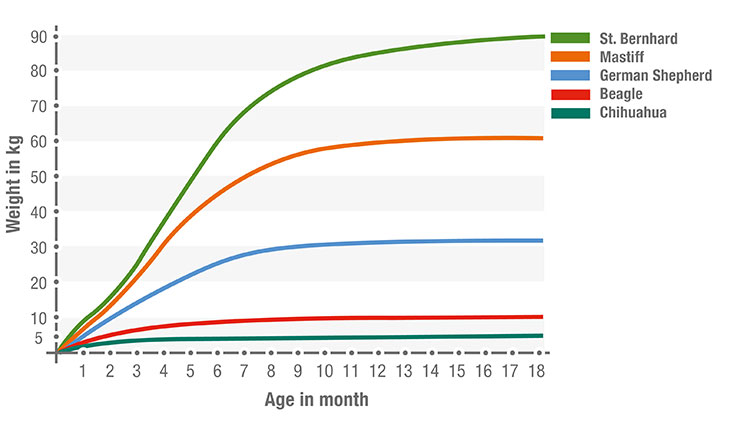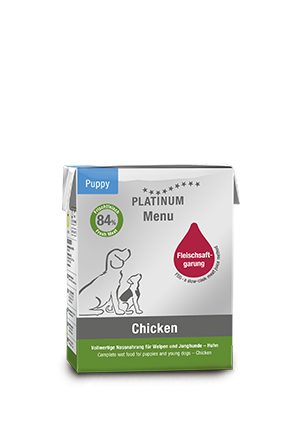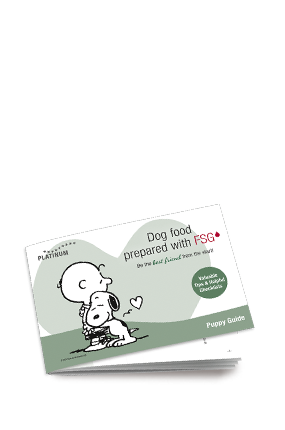The growth
The main growth phase for your dog spans from the third to the seventh month. You will be amazed at how quickly your little puppy grows. The small and clumsy four-legged friend, who was once only the size of your hand, will grow bigger and bigger at a rapid pace.
Growth duration and speed
While small dogs are fully grown at eight months, medium-sized dogs continue growing for up to a year. The large breeds take up to one and a half years, and the giant breeds take up to almost two years in order to reach their final size. A dachshund weighs 25 times the amount he weighed at birth by his first birthday. In contrast, a Great Dane’s weight increases a hundredfold from its birth weight during the same period of time.
Your dog’s muscle mass will increase quickly in the first few months, which is supported by a skeleton that is still very soft. In order to prevent lasting damage, you should take it easy with your dog in the first few months and in particular avoid climbing stairs, running next to the bike or taking walks that are too long. A balanced diet is of essential importance in order for your puppy to be able to develop into a healthy mature dog. In addition to the quality and composition of the food, the amount of food as well as the intake of energy play an important role in growth. Unfortunately, it is difficult to tell if you feed a puppy more energy than he needs – unlike with mature dogs – because puppies of large breeds rarely become fat: Instead, they conceal the excess energy in their growth. So a puppy often remains very lean. This makes it difficult for the dog owner to realistically estimate the nutritional status of their dog and the required amount of food.
The growth curve of dogs
It is important that the dog does not grow too quickly to ensure healthy skeletal and joint development. That’s why it makes sense to check weight trends on the basis of a growth curve. On the basis of this curve, you can determine how much the dog should approximately weigh at a certain age. Here at PLATINUM, we are able to offer you valuable assistance, which can be crucially important – particularly in this key time of growth – for a dog’s entire life: As a PLATINUM customer you also have the opportunity to ask our PLATINUM Service Team to regularly check the development of your puppy based on a growth curve and help achieve the perfect growth pattern.
Our PLATINUM Service Team looks forward to your call on the free service number, 0800 364 36 63.

The expected final weight
The most noticeable difference between dogs is their final weight: The difference between a fully grown chihuahua and a fully grown St Bernard is a weight difference ratio of 1 to 80. Such serious differences must then be considered in terms of the optimal food for your dog.
The developmental stages of your puppy
After his birth, the puppy will go through various development phases:
Neonatal phase: 1 to 2 weeks
In the first two weeks after the birth, the eyes and outer auditory canals are still closed, but the sense of smell is already well-developed. With his sense of smell and also his search for a source of warmth, the puppy finds its way to the milk filled teats. The body temperature cannot yet be regulated independently. The little dog sleeps or drinks for almost the whole day.
Transition period: 3 weeks
The eyes and the auditory canals open and the puppy can now see and hear. He begins to become more agile and more aware of his surroundings, especially of his littermates. The first teeth break through.
Conditioning phase: 4 to 7 weeks
The little dog becomes even more familiar with his surroundings. He is able to perceive environmental stimuli and also becomes noticeably more curious. Differences in temperament emerge to some extent. It is important that the puppy is not isolated during this phase. Contact with his littermates, but also with people, is important.
Socialisation phase: 8 to 12 weeks
This is a very important phase in a dog’s life. The long-term future behaviour of the dog can be shaped during this period. He should learn as much as possible, but without inundating him with stimuli. Ideally, you should use the phases when the puppy is active by nature. The aim is a dog who can be confident and self-assured, even in new situations. An important basis for harmonious coexistence of man and animal!
Hierarchy and pack order phase: 3 to 6 months
The dog seeks out his position in his interactions with his social partners. It is important during this phase that the puppy knows his boundaries. He should receive clear rules that he can understand.
Puberty phase: 7 to 12 months
Generally, at this age, the male dog will lift his leg for the first time and the female dog will be in heat for the first time. This is often accompanied with a certain “defiant phase”, where the dog appears to forget things he has learnt and increasingly tries to push his boundaries. It is important to continue to work with the dog with loving consistency.
Maturity phase: from 12 to 30 months
The young dog now finally becomes an adult during this last phase. It is important to continuously train with the dog. A dog needs – both physically and mentally – to be told what to do and never stops learning. The joint activity encourages the bond and trust between dog and owner!
Product recommendations
The benefits of PLATINUM dog food
- PLATINUM uses a unique preparation method called FSG, which offers numerous advantages compared to conventional dog food.
- Dog food prepared with FSG is gently cooked only in its own meat juice and is therefore nutrient-rich like BARF, excellent for building muscles and also extra tasty for your dog.
- With at least 70% fresh meat in the dry dog food and 83% fresh meat or fresh fish in the wet dog food, PLATINUM places great value on a composition of the food that is adapted to the needs of dogs.
- The declaration and composition of dog food prepared with FSG is tested regularly and independently by ELAB Analytik GmbH (formerly TÜV SÜD ELAB) - for canine health protection.
- PLATINUM is generally very well accepted by dogs of all breeds and ages. Even four-legged friends with sensitive digestion or intolerances usually tolerate PLATINUM dog food well.
- All products are free of soya, GMOs and gluten. In addition, no flavour enhancers, attractants, odourants or colourings are used.
- Over 2,000 positive customer reviews at Trusted Shops speak for themselves!








.png)

.png)
